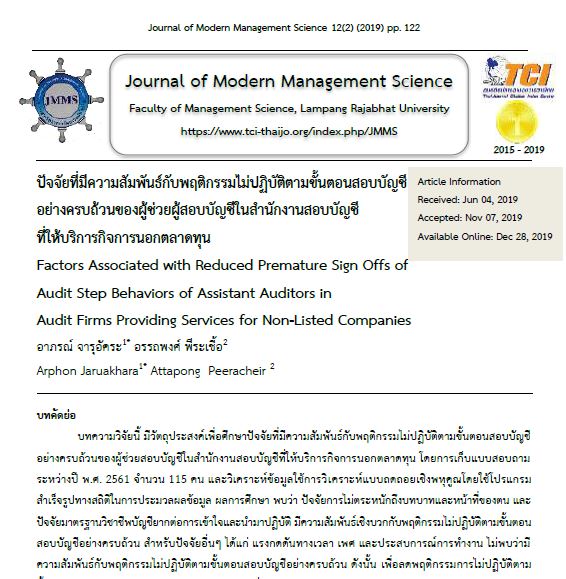Factors Associated with Reduced Premature Sign Offs of Audit step Behaviors of Assistant Auditors in Audit Firms Providing Services for Non-Listed Companies
Main Article Content
Abstract
This research aims to investigate the factors which affect the Premature Sign Offs of audit step behaviors of assistant auditors in audit firms providing services for non-listed companies of Thailand. The study is based on questionnaire survey of 115 assistant auditors conducted in 2018. Data analysis includes multiple regression using processing software packages. The research found that “unrealization in obligation” and “difficulty to understand and apply in professional standards” have significantly positive effect on premature sign offs of audit step behaviors. Furthermore, time pressure, gender, and experience have no effect on premature sign offs of audit step behaviors. Therefore, to reduce premature sign offs of audit quality, audit-firms providing services for non-listed companies of Thailand are encouraged to implement measures for assistant auditors to strengthen their pride and awareness in the role and duties, and support them in developing continuous professional standards knowledge.
Article Details
The article must be considered and accepted for publication by the editorial board of the Faculty of Management Science, Lampang Rajabhat University. The articles have been reviewed by a peer (peer review) and the author must update according to the suggestion if available before publication. Articles that are not considered the editorial team will inform the results of the consideration but will not send the original to the author.
JMMS is the Faculty of Management Science journal, Lampang Rajabhat University. Jmms published both print and online editions. We allow the use of articles for academic use under the scope of copyright law.
References
จาก https://www.dbd.go.th/ewt_news.php?nid=1078& filename=index
จิราภรณ์ ปะจันทะสี, ไพลิน นิลนิยม และศุทธินี ปราชญ์ศรีภูมิ. (2559). ผลกระทบของสมรรถนะการสอบบัญชีสมัยใหม่ที่มีต่อประสิทธิภาพการสอบบัญชีของผู้สอบบัญชีภาษีอากรในประเทศไทย. วารสารการบัญชีและการจัดการ, 8(4), 181-192.
จิราวัลย์ จิตรถเวช. (2558). การวิเคราะห์ถดถอย. กรุงเทพฯ: สถาบันบัณฑิตพัฒนบริหารศาสตร์.
จุรี วิชิตธนบดี. (2543). ความรู้ความเข้าใจเกี่ยวกับมาตรฐานการบัญชีของผู้ประกอบวิชาชีพการบัญชี ในเขตอำเภอเมืองจังหวัดเชียงใหม่. วิทยานิพนธ์บัญชีมหาบัณฑิต. บัณฑิตวิทยาลัย มหาวิทยาลัยเชียงใหม่.
ดรุณี วงษ์ศิลป์, ศรีรุ่งรัตน์ สุดสมบูรณ์, และณัฐวุฒิ ตันติเศรษฐ. (2556). ผลกระทบของความจงรักภักดีต่อวิชาชีพการสอบบัญชีที่มีต่อคุณภาพการสอบบัญชีของผู้สอบบัญชีในสำนักงานตรวจบัญชีสหกรณ์ในเขตภาคตะวันออกเฉียงเหนือ. วารสารการบัญชีและการจัดการ, 5(1), 46-55.
นฤนาถ ศราภัยวานิช. (2556). คุณภาพงบการเงินของวิสาหกิจขนาดกลางและขนาดย่อมในประเทศไทย. วารสารบริหารธุรกิจ เศรษฐศาสตร์และการสื่อสาร, 8(2), 21-30.
นิลุบล คงไมตรี, กัญญมน วิทยาภูมิ และไพลิน นิลนิยม. (2558). ความสัมพันธ์ระหว่างความรับผิดชอบทางบัญชีกับประสิทธิภาพการปฏิบัติงานของนักบัญชีองค์การปกครองส่วนท้องถิ่นในจังหวัดกาฬสินธุ์. วารสารการบัญชีและการจัดการ, 7(1), 119-127.
บุญช่วง ศรีธรราษฎร์, ไพรัช พรพันธ์เดชวิทยา และศรีรุ่งรัตน์ สุดสมบูรณ์. (2554). ความสัมพันธ์ระหว่างความเชี่ยวชาญการสอบบัญชีกับคุณภาพการสอบบัญชีของผู้สอบบัญชีรับอนุญาตในประเทศไทย. วารสารการบัญชีและการจัดการ, ฉบับพิเศษ, 49-61.
วาสนา พัฒนานันท์ชัย. (2553). ปัจจัยที่มีผลต่อแรงจูงใจในการปฏิบัติงานของพนักงานสำนักงานทรัพย์สินส่วนพระมหากษัตริย์. การค้นคว้าอิสระศิลปศาสตรมหาบัณฑิต. สถาบันบัณฑิตพัฒนบริหารศาสตร์.
วีรณา ติรณะประกิจ และศิลปพร ศรีจั่นเพชร (2552). ปัจจัยที่มีความสัมพันธ์กับพฤติกรรมที่ทำให้คุณภาพงานสอบบัญชีลดลง. วารสารวิชาชีพบัญชี, 5(14), 69-79.
สมพงษ์ พรอุปถัมภ์. (2559). เมื่อสำนักงานสอบบัญชีต้องทำตาม TSQC1. ค้นเมื่อ 9 ตุลาคม 2560, จาก https://account.cbs.chula.ac.th/2016/10/17/เมื่อสำนักงานสอบบัญชี
สายชล สินสมบูรณ์ทอง. (2559). การวิเคราะห์ตัวแปรหลายตัว. กรุงเทพฯ: จามจุรีโปรดักส์.
สำนักงานคณะกรรมการกำกับหลักทรัพย์และตลาดหลักทรัพย์. (2557). รายงานสรุปกิจกรรมการตรวจคุณภาพงานสอบบัญชี 2556. ค้นเมื่อ 16 กันยายน 2560, จาก https://www.sec.or.th/ TH/RaisingFunds/
EquityDebt/Documents/activities_report_th_2556.pdf
อารยา แป๊ะป๋อง. (2558). การศึกษาปัจจัยส่วนบุคคล การประเมินองค์กรแบบสมดุล และการทำงานเป็นทีมที่ส่งผลต่อประสิทธิผลในการทำงานของพนักงานระดับปฏิบัติการในเขตย่านธุรกิจการค้าสีลม. การค้นคว้าอิสระบริหารธุรกิจมหาบัณฑิต. มหาวิทยาลัยกรุงเทพ.
Breesch, D. & Branson, J. (2009). The Effects of Auditor Gender on Audit Quality. IUP Journal of Accounting Research & Audit Practice, 8(3), 78-107.
Choo, F., & Firth, M. (1998). The Effect of Time Pressure on Auditors’ Configural Information Processing. International Journal of Auditing, 2, 21-33.
Coram, P., Glavovic, A., Ng, J. & Woodliff, D. (2008). The Moral Intensity of Reduced Audit Quality Acts. Auditing. Journal of Practice & Theory, 27, 127-49.
Donnell, O. & Johnson, N. (2001). The Effect of Auditor Gender and Task Complexity on Information Processing Efficiency. International Journal of Auditing, 5, 91-105.
Gundry, C. & Liyanarachchi, A. (2007). Time Budget Pressure, Auditors’ Personality Type, and the Incidence of Reduced Audit Quality Practices. Pacific Accounting Review, 19(2), 125-152.
Hyatt, A. & Taylor, H. (2013). The Effects of Time Budget Pressure and Intentionality on Audit Supervisors’ Response to Audit Staff False Sign-off. International Journal of Auditing, 17, 38-53.
Jais, M., Nawawi, A. & Salin, P. (2016). Reduction of Audit Quality by Auditors of Small and Medium Size Audit Firms in Malaysia: A Case of Premature Sign-off of Audit Documents. Journal of Accounting – Business & Management, 23(2), 1-12.
Nehme, R., Mutawa, A. & Jizi, M. (2016). Dysfunctional Behavior of External Auditors the Collision of Time Budget and Time Deadline Evidence from a Developing Country. The Journal of developing Areas, 50(1), 373-389.
Reheul, M., Ceneghem, V., Bogaerd, V. & Verbruggen, S. (2017). Auditor Gender, Experience and Reporting in Nonprofit Organizations. Managerial Auditing Journal, 32(6), 550-577.
Soobaroyen, T. & Chengabroyan, C. (2016). Auditors’ Perceptions of Time Budget Pressure, Premature Sign Offs and Under-Reporting of Chargeable Time: Evidence from a Developing Country. International Journal of Auditing, 10, 201-218.
The University of California Los Angeles. (2018). What dose Cronbach’s Alpha mean? Retrieved February 12, 2018, from https://stats.idre.ucla.edu/spss/faq/what-does-fcronbachs-alpha-mean/


